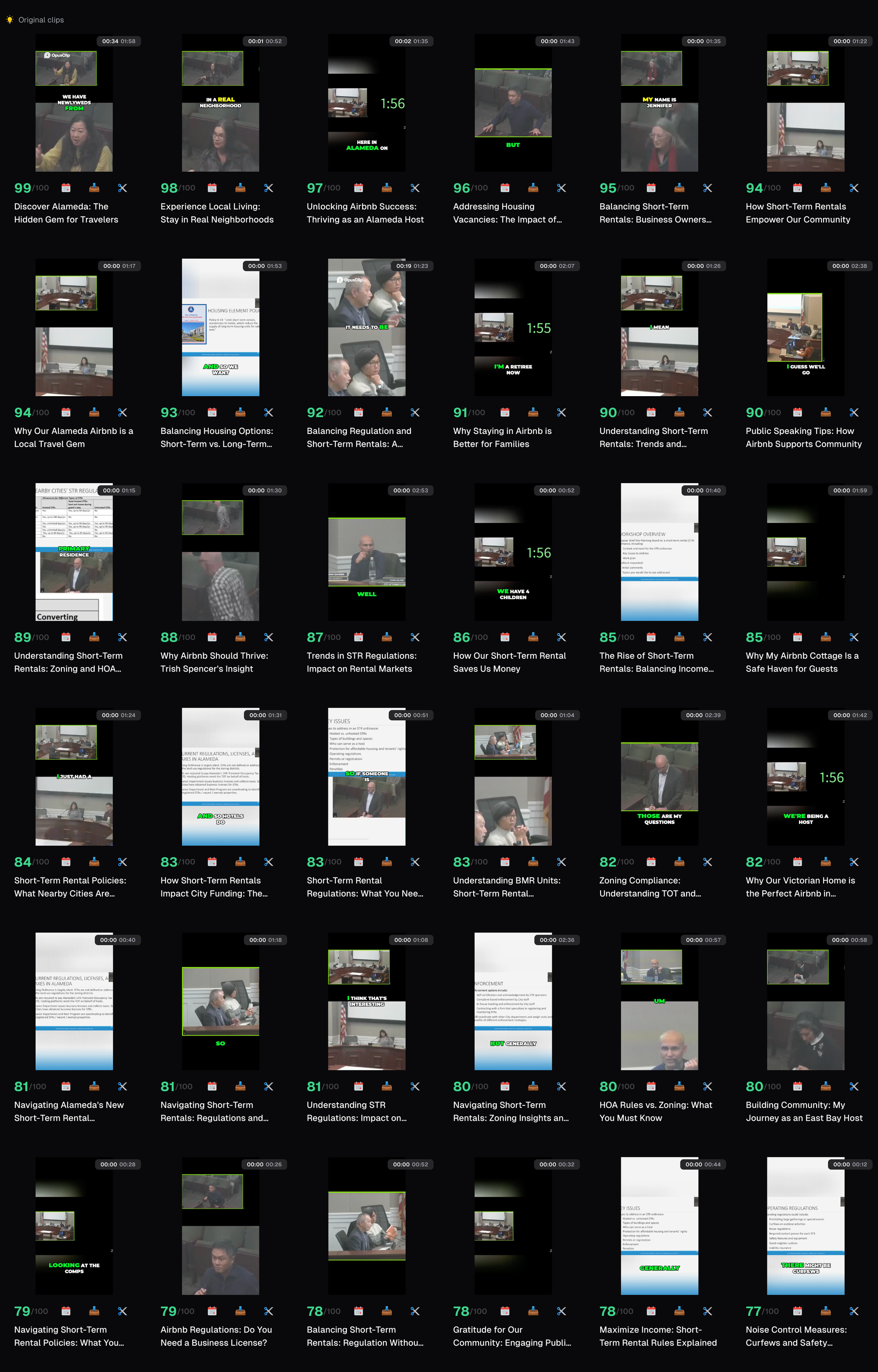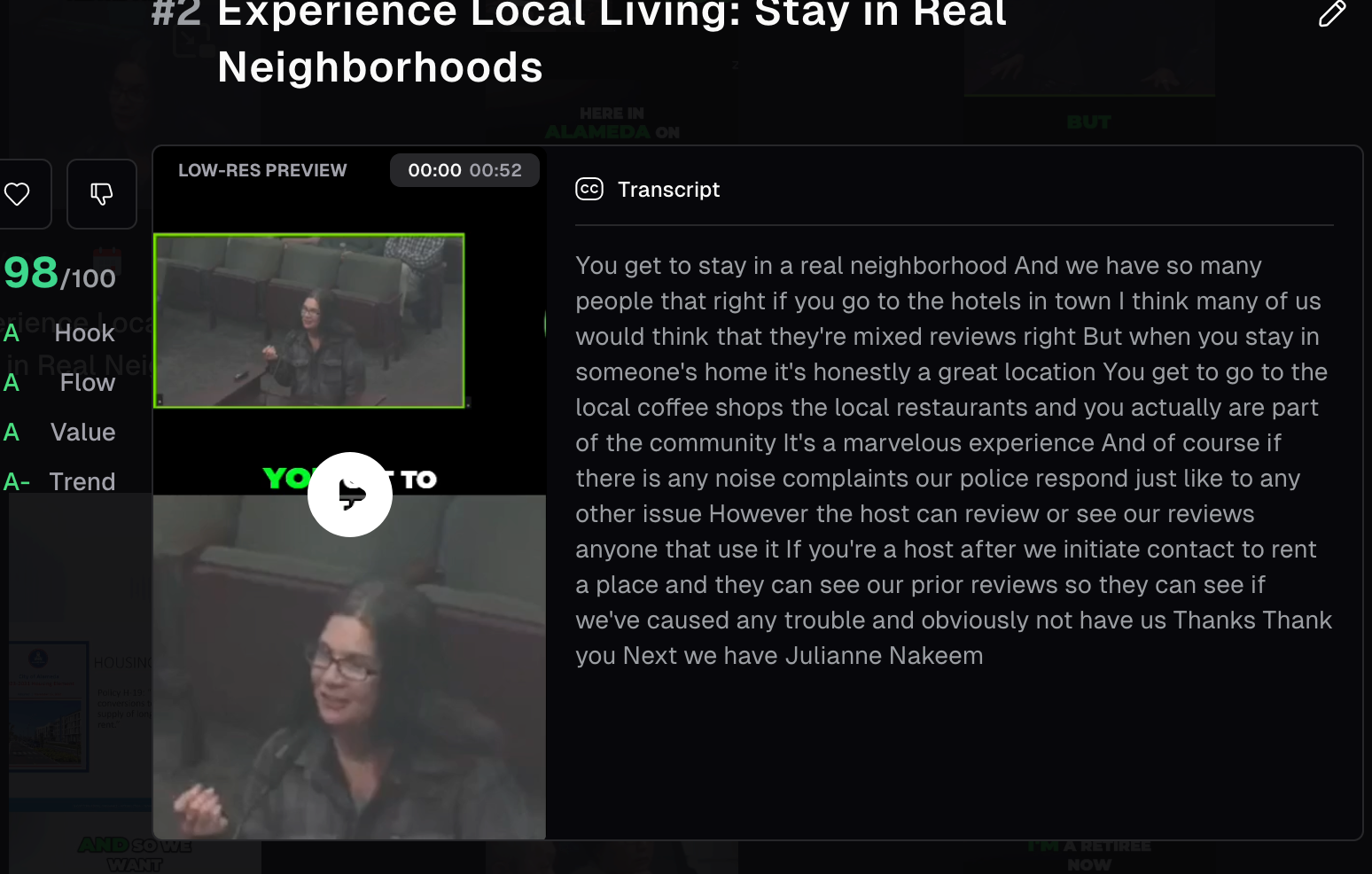At its February 10 meeting, Alameda's Planning Board started studying the topic of short-term rentals and how these might affect Alameda's overall housing supply. A reasonably large number of residents turned out to give public comment — likely because a for-profit corporation used a targeted algorithm to encourage them to head into Alameda City Hall on that Monday evening.
This isn't a conspiracy theory. It's just the standard operating procedures for many consumer-oriented app-based companies these days.
Airbnb crafted this playbook back when San Francisco tried to regulate short-term in-home rentals in 2015. As recently described in The New Yorker:
[Airbnb’s head of global policy and public affairs Chris Lehane's] first step in this role was to mobilize Airbnb’s natural advocates: the homeowners who were profiting by renting out their properties, and the visitors who had avoided pricey hotel rooms by using the service. By the end of 2015, more than a hundred and thirty thousand people had rented or hosted rooms in San Francisco. Lehane recruited several former Obama-campaign staffers to lead teams who made tens of thousands of phone calls to Airbnb hosts and renters, warning them about Proposition F. The team members also urged hosts to attend town-hall meetings, talk to neighbors, and call local officials. During this period, the company—accidentally, it says—sent an e-mail to everyone who had ever stayed in a California Airbnb, urging them to contact the California legislature. The legislature was inundated with messages from around the world. The Senate president pro tem called Lehane to let him know that the message had been received, and to beg him to stop the onslaught.
While much more modest in scale, this recent Alameda Planning Board meeting demonstrates how Airbnb can still activate their customer base.
This blog post isn't as much about the substantive topic of regulating short-term rentals — for that you can read an overview of this Planning Board meeting by Karin Jensen in the Alameda Post — instead it's more about using software platforms to engage and turn out stakeholders at local public meetings. So toward that end, I thought I'd try out a software system to algorithmically parse all this algorithmically-encouraged public-comment content.
I fed the ~90 minutes of that Planning Board meeting into a web app called OpusClip and it used its "AI" to cut short videos of the most "engaging" portions of this "content."
The software claims to score each generated clip by evaluating its likelihood to "go viral" on TikTok, YouTube Shorts, and Instagram Reels. The clips are sorted by score, so you can easily focus on just the most potentially infectious of utterances and press one button to post 'em to all your "socials":

Instead of algorithmically critiquing the top comment by a random member of the public, we'll go to clip #2 as ranked by viralness: a public comment from former councilmember/former mayor/former school board member Trish Herrera Spencer, who came to this Planning Board meeting. (The Alameda Post also quoted from her public comment, but just identified her with her first name and as "a long-term renter.")
Per the "AI," this clip of a public comment generated a Viral Score of 98/100:

The "Viral Score" is broken down into components, with suggestions for how to further improve this public comment, such as:
Flow:This transcript cogently reinforces the benefits of staying in an Airbnb versus a traditional hotel, effectively articulating community integration and local experience. It maintains a logical flow and offers compelling examples. As a minor suggestion, including a concluding remark that ties together the personal experiences with the broader implications for local tourism or community dynamics could enhance the completeness further.
Perhaps the lobbying team at Airbnb would like to use this software system to coach their customers and fans to further refine public comments for the next Planning Board meeting on this topic? But compared to all the short videos of mesmerizing dancing and stupid stunts and nation-state propaganda on TikTok, these public comments certainly can't be above the 90-percentile in their potential to be shared widely. This is just people talking at a random public meeting late on a Monday evening. The "AI" is inflating the grade, probably to encourage me to upgrade to a paid plan.
I don't have a TikTok account or an Instagram account. I'm the sort of person who's blogging here like it's the early 2000s. So instead of posting these software-generated videos to further spread the word about "benefits of staying in an Airbnb versus a traditional hotel," we'll just get back to the point of this post...
Homeowners in Alameda who rent out their properties for short-term stays are real constituents in Alameda and their comments are valid. One of our neighbors lives in a duplex and rents out the other unit. It's well utilized, and has never been a disruption to anyone else on the street (other than the one time recently when some visitors played soccer in the middle of our street and blocked auto traffic — which I personally appreciated :) It would be fascinating to understand how that unit's revenue compares to leasing it out as normal permanent housing. That would be an uncouth question to ask an individual neighbor — but it's exactly the kind of question that the Planning Board should be studying in the aggregate.
Is a meaningfully smaller amount of permanent housing available because landlords are renting some of their properties as hotels? If so, should the city consider putting in place regulations that constrain some of the currently unlimited flexibility that home-owners have? Should the city consider increasing its transient occupancy tax and directing some those revenues toward long-term housing programs? Or are there other approaches worth considering?
Those more systematic questions — questions that don't have clear answers because they involve tradeoffs and weighing the concerns of many stakeholders — may be much harder to algorithmically capture and distill into a short video ready to post to TikTok.
Even more importantly, it's a challenge to engage the much broader community of people who care about housing availability and housing affordability. This evaluation of short-term rentals in Alameda is one aspect of Alameda's comprehensive Housing Element. But of the many people and organizations consulted during that ~2 year process (and of the many more who are affected by the Bay Area's housing crisis), few are probably now following this specific Planning Board meeting on a Monday evening — other than those who received a proactive ping from an online short-term rental marketplace.
It's likely to our overall detriment that algorithmically-generated attention — not just at the national level, but even at the local level — is easiest to drive and to virally spread in the straightforward interests of making money, rather than also in service of more complex civic concerns.
The output is certainly interesting, even if needs manual review to actually be useful.
All that to say that there's no need to label this giant hairball of software and data as "Artificial Intelligence" — other than if you're a venture capitalist.